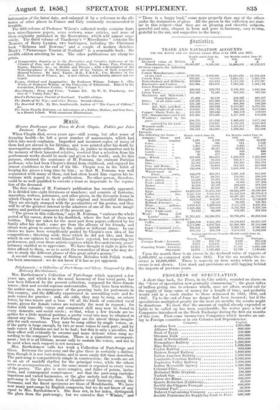Polyhytnnia : a Collection of Part-Songs and Gkes. Composed by
Hrs. Mounsey Bartholomew.
Mrs. Bartholomew's Collection of Part-Songs which appeared a few years ago' and which is in the usual harmony of four vocal parts, has now been followed by the present collection, composed for three female voices-first and second soprano and contralto. They have been written, the author says, in consequence of the growing taste for part-music in this country, and the difficulty experienced in assembling male and fe- male voices for practice : and, she adds, they may be sung, an octave lower, by two tenors and a bass. Of all the kinds of concerted vocal music, pieces for female voices are naturally the most in request ; for ladies with tuneable voices and competent skill may now be found in every domestic and social circle ; so that, when a few friends are to- gether for a little musical pastime a pretty vocal trio may be obtained at almost any time. These new Part-Songs are the nicest things imagin- able for such occasions. They may be sung either by single voices, or, if the party is large enough, by two or more voices to each part ; and by male voices if females are not to be had ; but this is only a pis-aller, for their effect will evidently be sweeter and more delicate when sung ac- lording to the composer's intention. There is a pianoforte accompani- ment ; but it is ad libitum, meant only to sustain the voices, and not to be used when such support is not necessary.
Mrs. Bartholomew calls her work a Collection of Part-Songs and Glees. Between the part-song and the glee there is certainly a distinc- tion, though it is not very definite, and is more easily felt than described. The part-song is comparatively simple in construction ; the words are set to an air of marked rhythm for the principal voice, while the others serve as accompaniments, and the same music is repeated to every verse of the poetry. The glee is more complex, and fuller of points imita- tions, and contrapuntal contrivances : not that the part-song excludes ingenious and varied harmonies, or the ,glee melody and rhythm. The part-song is the favourite form of chamber vocal harmony among the Germans, and the finest specimens are those of Mendelssohn. We have now many part-songs by English composers, but we do not know of an equal to Mrs. Bartholomew's. She does not, in her index, distinguish the glees from the part-songs ; but we conceive that "Winter," and "There is a happy land," come more properly than any of the others under the designation of glees. All the pieces in the collection are simi- lar in this respect-that they are on pleasing and cheerful subjects, graceful and airy, elegant in form and pure in harmony, easy to sing, grateful to the ear, and suggestive to the fancy.


































 Previous page
Previous page